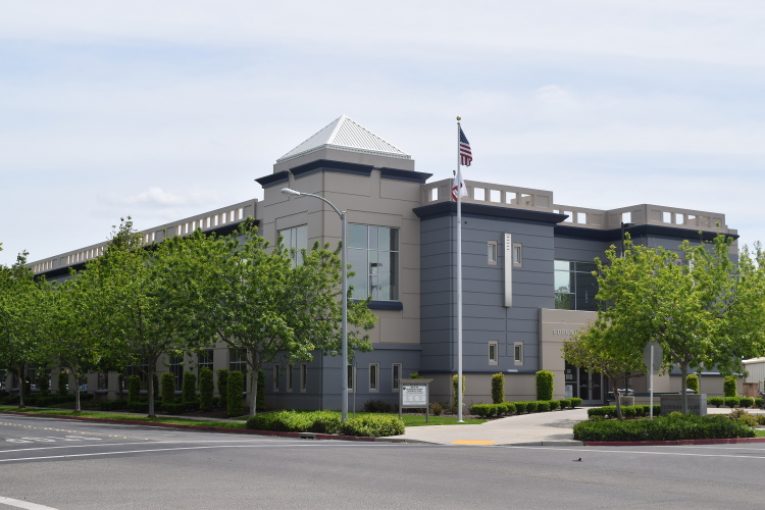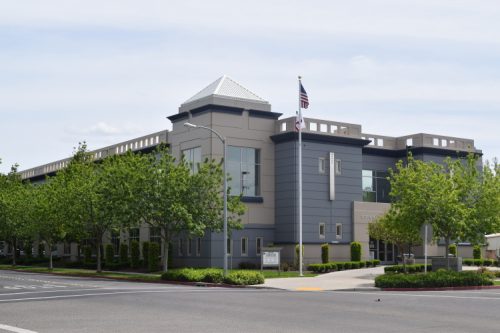

By Crescenzo Vellucci
Vanguard Sacramento Bureau Chief
MERCED, CA – Testimony ended here in Merced County Superior Court Wednesday in the trial of Hollywood actress Alexandra Paul and San Francisco Bay Area activist Alicia Santurio, who are on trial on misdemeanor petty theft charges for rescuing at-risk chickens from a truck just before it entered a Foster Farms slaughterhouse in Livingston, CA, Sept. 28, 2021.
Closing arguments from lawyers are to be given Thursday when the case is expected to go to the jury.
Both accused have admitted on the stand they took the Foster Farms “property” to prevent a “greater harm,” describing the chickens as sick and unable to stand, something attested to by a veterinarian witness.
And there’s a video the accuseds published at (https://youtu.be/LxnIwWmFd1E)
The trial actually began early last week, but a sick judge and jury selection delayed actual court testimony until this week.
Paul, a “Baywatch” television star and who has appeared in prominent television and screen movies for several decades, said previously, “We published (a video) within an hour (of the open rescue) with both my name and Alicia Santurio’s name attached to it because we believe what we’re doing is legal and morally right. We’re rescuing sick chickens from a factory farm that has a history of abusing them.”
Her testimony this week didn’t vary, noting to the jury, ““I knew it was a Foster Farms truck; they treated (the chickens) like garbage,” adding she wouldn’t have given the sick chicken (she took) back to “someone who treated him so badly (chicken).”
Paul argued, “I believe factory farms can make companies a lot of money. I made a judgment call (to rescue the chicken). I take full responsibility.”
Paul said “scalding animals alive is cruel,” and explained to the court what “open rescue” is, at least to her.
“We are completely transparent in what we are doing…we believe what we do is legal,” said Paul, noting she and her co-accused didn’t wear masks and published the video of their deed.
“We only rescue animals who need us the most…(they) best tell the story of what’s happening behind closed doors. I saw open rescue as the best way to alleviate suffering,” Paul said, noting whistleblower footage she saw showing chickens “boiled alive and buried alive and nobody had done anything in last six years” since a 2015 video reportedly led to Foster Farms promising to treat the animals better.
“Who’s going to do it if not us, if not I…if the government isn’t doing it or law enforcement isn’t doing it,” explained Paul.
The actress maintained in court, “I believe animal protection laws protect me,” citing legal opinions that suggest when an animal is suffering, “I would have right to rescue that animal.
“I saw footage of animals treated cruelly at that facility,” added Paul, carefully noting she did not want to deprive Foster Farms of their property, but only had the “intent” to “help an animal…I believe it was legal and morally right.”
She added, in another action, she rescued a chicken she found in a dumpster where it had been thrown away, while it was alive, noting “all the bodies…lots of factory farms are not following the law…government agencies were not doing anything.”
In response to questions about the American Humane Association which is supposed to approve of the treatment of animals—on farms, the movies and entertainment—Paul had nothing good to say, charging that “if you google AHA scam…their standards are very low,” adding “the AHA allows (young) cows to be castrated without any anesthesia; these are babies, I find that cruel.”
“We all can agree boiling animals alive and burying them alive is not right,” she added, explaining investigators have tried to speak with Foster Farms and the treatment of animals but “they haven’t responded.”
She said sick and injured chickens “should be taken off the food chain” but instead workers—“it’s not their fault; the lines go too fast”—throw live chickens on the ground and abuse them.
Actress Daphne Zuniga—known from TV’s “Melrose Plan,”—made a brief appearance in court as a character witness for Paul, testifying how “impressed” she’s been with Paul, noting how Paul had “walked across the country for peace…she cares about people…blessed to have her in my life; I trust her; she’s a compassionate person.”
Santurio said, on the stand, Foster Farms treats chickens “like garbage” and that AHA is a “rubberstamp for factory farms, slaughterhouses…they announce beforehand they’re coming” and just make money for covering up animal abuse.
She said, “We had a camera because I do open rescue and we want to show the world what’s happening…because we’re doing a legal and moral thing.
“My intent is to rescue animals…we believe we have a right to rescue animals companies are neglecting.” The animals are “being abused and really need help. What I’m doing is preventing a greater harm,” she said.
Santurio testified about “animal cruelty and neglect” she has seen inside Foster Farms factory farms during investigations at five different facilities.
Wednesday, Sherstin Rosenberg, DVM, consulted on the treatment plan for Jax and Ethan (the latter later died)—the two freed chickens—and said both birds were infected with an “extremely contagious coronavirus called infectious bronchitis virus (IBV),” and that other pathogens found on Ethan posed a risk to public health.
Shane Sutton, Vice President of Operational and Strategic Accounting at Foster Farms and called by the prosecution, testified birds “unfit for human consumption” are still rendered and still have some value.
According to a statement by Direct Action Everywhere (DxE), supporters of Paul and Santurio, last year a Utah jury “issued a groundbreaking “not guilty” verdict for two DxE investigators who rescued sick piglets from a Smithfield Foods factory pig farm. The acquittal has been hailed as a landmark moment to establish the ‘Right to Rescue’ animals in distress, and the legal status of animals more broadly.”
“Following the acquittal of animal rescuers in Utah, I am optimistic that the same will happen in California,” said Paul, adding, “Ordinary people want to see animals treated with respect and they know that the true crime is hurting animals, not rescuing them.”
“There is something deeply wrong with our current system when those who help animals face time in jail and are treated like criminals, while those who harm them make millions in profit,” said Santurio.
Although there has been considerable testimony about why the accused felt they had the right to rescue “sick” chickens, the judge earlier ruled they could not formally use the “necessity defense.”
The necessity defense “involves a determination that the harm or evil sought to be avoided by such conduct is greater than that sought to be prevented by the law defining the offense charged. Necessity does not negate any element of the crime, but represents a public policy decision not to punish an individual despite proof of the crime,” argued the defense in its motion in limine.
Cases from the late 1990s, according to the defense filing, explain that to “justify an instruction on the defense of necessity, there must be evidence sufficient to establish that defendant violated the law (1) to prevent a significant evil, (2) with no adequate alternative, (3) without creating a greater danger than the one avoided, (4) with a good faith belief in the necessity, (5) with such belief being objectively reasonable, and (6) under circumstances in which he did not substantially contribute to the emergency.”
Defense counsel argued the accused “acted in an emergency to prevent a significant evil,” citing CA law that “explicitly authorizes…trespass to provide an animal with necessary food and water,” and the “needless suffering of animals (the freed chickens) is a significant evil that public policy aims to curtail.”
The defense also cited several examples of laws in CA being broken to protect the well-being of animals, and argued in its motion that the accused’s “conduct was not pre-empted by explicit public policy. Rather, it was entirely consistent with California’s public policy to minimize animal cruelty.
“Upon looking inside the transport truck, Ms. Santurio saw Ethan ‘downed’ with splayed legs. This led her to immediately believe, based on her experience caring for similar birds, that he was suffering from acute pain and distress,” the defense argued.
On the day Santurio and Paul rescued the two birds, DxE released hidden camera footage from “inside the slaughterhouse showing chickens routinely missing the stun bath and a device designed to cut their necks, leaving it to workers to identify conscious birds before their evisceration, at a speed of 140 birds per minute.”
According to a story in The Intercept, an animal rights group, Mercy for Animals, in 2015 said it “documented workers throwing live chickens against metal shackles, birds being scalded alive, and other treatment that the group argued amounted to animal cruelty.
DxE’s new footage, said The Intercept, shows Foster Farms, California’s largest poultry producer, “continuing to engage in similar behavior that activists allege amounts to cruel treatment of live chickens. Foster Farms, which was recertified by the AHA earlier this year, has been on the receiving end of millions of dollars in state and local subsidies to expand its product lines in California.”
The Intercept, after it viewed the footage, said it “shows workers throwing live chickens on the concrete floor; discarded yet conscious birds under the weight of one another; some chickens missing electrical waterbaths designed to stun them before slaughter — all under the supervision of employees working dangerous and long shifts in the dark.”
DxE alleges the footage details “a violation of California code outlawing animal cruelty, Foster Farms’ AHA certification, and the company’s own policy to raise chickens free from hunger, discomfort, pain, cages, and distress.”
The accused took their actions to “prevent a greater danger” because authorities failed, said the defense, to do their duty, noting that after underground video showed the treatment of the chickens, Mercy for Animals complained to the Federal Trade Commission that Foster Farms’ labeling of its products as certified by the American Humane Association, or AHA, deceived consumers. The agency declined to take action.”
The defense maintained in its motion the caged chickens “would not be provided with such care and worse, would likely suffer unlawful animal cruelty…a factfinder could conclude (the) actions in rescuing (the chickens) were necessary to prevent the significant evil of unnecessary animal suffering (and) there were no adequate legal alternatives.”
The defense added the chickens’ “obvious condition created the immediate need for rescue and care… (an) analogous situation to an overheating dog left unattended in a car. A reasonable person would act to save that animal and California law explicitly provides them immunity from criminal liability.”
DxE provided key clips of Alexandra Paul, Alicia Santurio and lawyers at:https://media.dxe.io/wl/?id=35UKOw69znS4L2uhipUoogeZ9dut3wRU